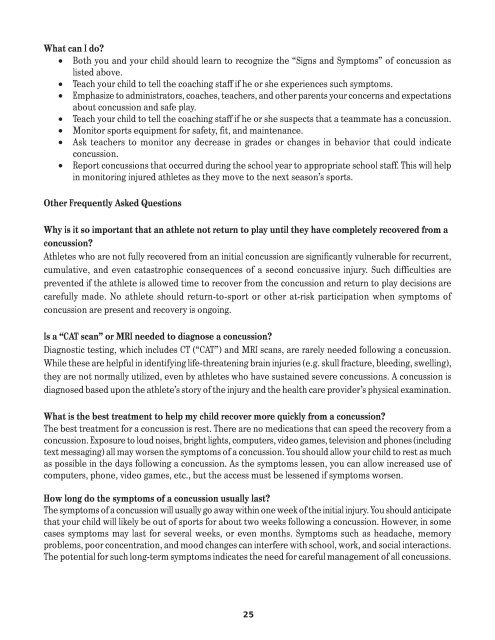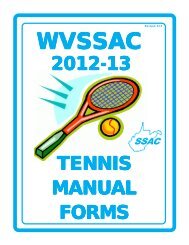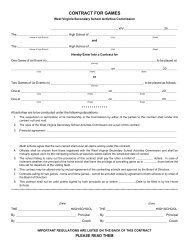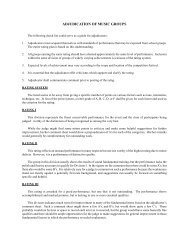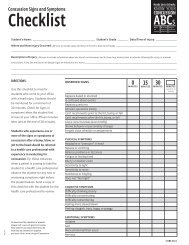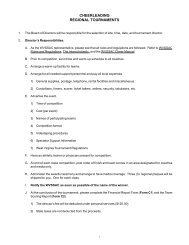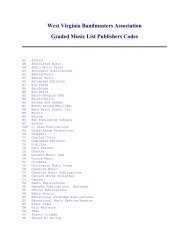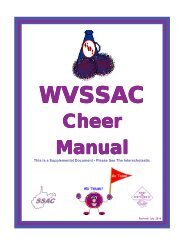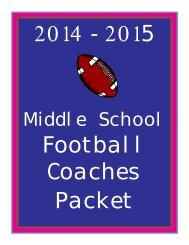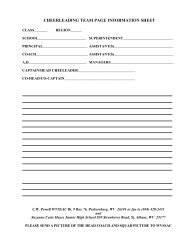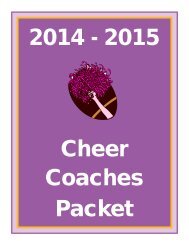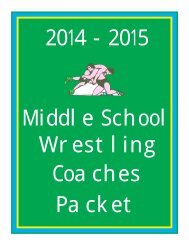Athletic Directors Packet - wvssac
Athletic Directors Packet - wvssac
Athletic Directors Packet - wvssac
You also want an ePaper? Increase the reach of your titles
YUMPU automatically turns print PDFs into web optimized ePapers that Google loves.
What can I do<br />
• Both you and your child should learn to recognize the “Signs and Symptoms” of concussion as<br />
listed above.<br />
• Teach your child to tell the coaching staff if he or she experiences such symptoms.<br />
• Emphasize to administrators, coaches, teachers, and other parents your concerns and expectations<br />
about concussion and safe play.<br />
• Teach your child to tell the coaching staff if he or she suspects that a teammate has a concussion.<br />
• Monitor sports equipment for safety, fit, and maintenance.<br />
• Ask teachers to monitor any decrease in grades or changes in behavior that could indicate<br />
concussion.<br />
• Report concussions that occurred during the school year to appropriate school staff. This will help<br />
in monitoring injured athletes as they move to the next season’s sports.<br />
Other Frequently Asked Questions<br />
Why is it so important that an athlete not return to play until they have completely recovered from a<br />
concussion<br />
Athletes who are not fully recovered from an initial concussion are significantly vulnerable for recurrent,<br />
cumulative, and even catastrophic consequences of a second concussive injury. Such difficulties are<br />
prevented if the athlete is allowed time to recover from the concussion and return to play decisions are<br />
carefully made. No athlete should return-to-sport or other at-risk participation when symptoms of<br />
concussion are present and recovery is ongoing.<br />
Is a “CAT scan” or MRI needed to diagnose a concussion<br />
Diagnostic testing, which includes CT (“CAT”) and MRI scans, are rarely needed following a concussion.<br />
While these are helpful in identifying life-threatening brain injuries (e.g. skull fracture, bleeding, swelling),<br />
they are not normally utilized, even by athletes who have sustained severe concussions. A concussion is<br />
diagnosed based upon the athlete’s story of the injury and the health care provider’s physical examination.<br />
What is the best treatment to help my child recover more quickly from a concussion<br />
The best treatment for a concussion is rest. There are no medications that can speed the recovery from a<br />
concussion. Exposure to loud noises, bright lights, computers, video games, television and phones (including<br />
text messaging) all may worsen the symptoms of a concussion. You should allow your child to rest as much<br />
as possible in the days following a concussion. As the symptoms lessen, you can allow increased use of<br />
computers, phone, video games, etc., but the access must be lessened if symptoms worsen.<br />
How long do the symptoms of a concussion usually last<br />
The symptoms of a concussion will usually go away within one week of the initial injury. You should anticipate<br />
that your child will likely be out of sports for about two weeks following a concussion. However, in some<br />
cases symptoms may last for several weeks, or even months. Symptoms such as headache, memory<br />
problems, poor concentration, and mood changes can interfere with school, work, and social interactions.<br />
The potential for such long-term symptoms indicates the need for careful management of all concussions.<br />
25


